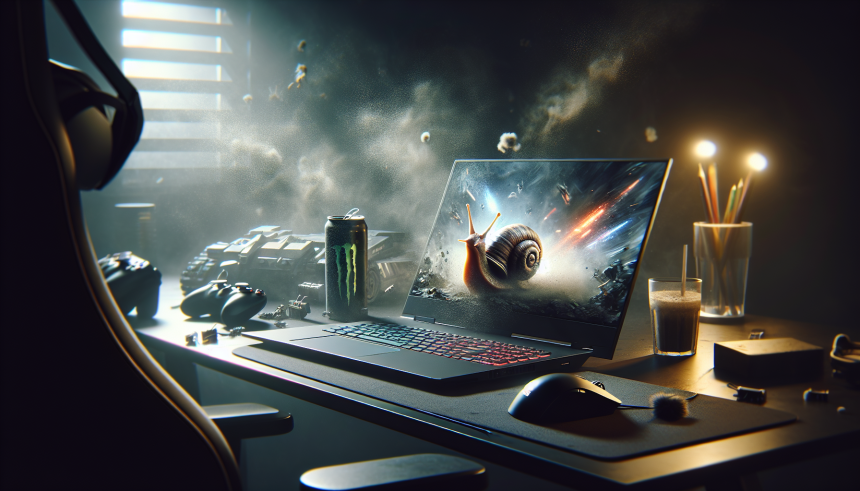If you’re a gamer, there’s nothing more frustrating than a sluggish gaming laptop. You may have even asked yourself, “Why is my gaming laptop so slow?” While gaming laptops are designed to offer superior performance for demanding games, various factors can cause them to slow down. This article will delve into these factors and provide solutions to enhance your gaming laptop’s performance.
Understanding the Issue
The first step in addressing a slow gaming laptop is understanding the potential causes. Your laptop’s performance can be impacted by several elements including the Central Processing Unit (CPU), Random Access Memory (RAM), Graphics Processing Unit (GPU), and your hard disk. Additionally, external factors like malware, poor ventilation, and outdated drivers can also contribute to a slow gaming laptop.
The Role of the CPU
The Central Processing Unit (CPU) is essentially the laptop’s brain. Its processing power greatly impacts your gaming laptop’s speed and overall performance. An outdated or underpowered CPU may struggle to handle the demands of modern games, resulting in a slow gaming experience.
Fixing CPU-Related Issues
Upgrading your CPU can significantly improve your gaming laptop’s speed, but it’s not always a feasible solution due to cost and compatibility issues. However, updating your system’s drivers—especially the CPU driver—can also boost performance. Regular system updates are crucial for keeping your laptop’s drivers up to date.
Ramming Up Performance with RAM
Random Access Memory (RAM) is the laptop’s temporary storage that runs programs and applications. The availability of RAM significantly affects gaming performance. If too many programs are running simultaneously or if you have multiple tabs open while gaming, it might cause your laptop to slow down.
Solving RAM-Related Problems
Increasing your laptop’s RAM can help resolve performance issues. Most gamers recommend upgrading from 8GB to at least 16GB or even 32GB. Additionally, closing unnecessary programs before launching games can free up RAM and enhance gaming performance.
The Impact of the Graphics Card & GPU
The Graphics Processing Unit (GPU), or graphics card, is responsible for rendering images on your laptop screen. An outdated graphics card might struggle to run modern games smoothly, resulting in a slower gaming experience.
Improving Graphics-Related Performance
Upgrading to a newer graphics card like Nvidia can significantly enhance your gaming experience. Additionally, check that your GPU is compatible with the game you’re playing.
The Effect of Hard Disk Performance
Your laptop’s hard disk can also affect gaming performance. Switching from a Hard Disk Drive (HDD) to a Solid-State Drive (SSD) can significantly reduce game loading times and improve your gaming experience.
SSD Upgrade
Upgrading to an SSD can also extend your laptop’s lifespan and ensure it has enough resources to run the games you want. Be sure to free up space on your gaming laptop as games typically consume a lot of storage.
External Factors Affecting Performance
Apart from hardware issues, external factors like malware, poor ventilation, and outdated drivers can also slow down your gaming laptop. Regular antivirus scans can keep your laptop clean and secure. Keeping your laptop in a well-ventilated area or using a laptop cooling pad can prevent overheating, which can otherwise lead to a slow laptop.
The Impact of Slow Internet Speed
A slow internet connection can significantly affect your gaming experience, causing lag and other issues. If you’re playing online games, make sure you have a fast and stable internet connection. Check your internet speed and troubleshoot any connection issues.
When to Consider an Upgrade
If your gaming laptop is outdated, unable to handle the latest games and software, or continuously running slow, it may be time to consider an upgrade. Research and choose a laptop that fits your budget and gaming needs.
Keeping Your Laptop Updated
Regular updates can ensure optimal gaming performance. Always have the latest drivers and software patches installed to fix any bugs and glitches.
Budget-Friendly Solutions
Optimizing your current laptop’s gaming performance is possible even if you’re on a budget. Consider upgrading your hardware, adjusting settings for better performance, or using websites that help you downgrade your old games for smoother gameplay.
Why people want their gaming laptop to be fast?
People want their gaming laptop to be fast for several reasons, including:
Gaming Performance: Gamers require fast laptops to ensure smooth gameplay, quick loading times, and minimal lag during intense gaming sessions. A fast gaming laptop enhances the overall gaming experience, allowing for better immersion and enjoyment.
Multitasking Abilities: Fast gaming laptops enable users to run multiple applications simultaneously, such as gaming, streaming, and browsing, without experiencing significant slowdowns or performance issues.
Efficient Productivity: In addition to gaming, many users utilize gaming laptops for demanding tasks such as video editing, 3D rendering, and software development. A fast laptop ensures efficient completion of these tasks, boosting productivity.
Playing casino games: For individuals who enjoy playing casino games on their gaming laptops, such as those available on Zimpler Casino, a fast laptop is essential for seamless and enjoyable gaming experiences. Quick loading times and smooth gameplay are crucial for an optimal casino gaming experience.
Conclusion
A slow gaming laptop can be frustrating, but understanding the underlying causes can help you find effective solutions. Whether it’s upgrading your hardware, closing unnecessary programs, or ensuring a stable internet connection, numerous strategies can enhance your gaming laptop’s performance.
So, the next time you find yourself asking, “Why is my gaming laptop so slow?” remember these tips and enjoy a smoother, faster gaming experience.
Lynn Martelli is an editor at Readability. She received her MFA in Creative Writing from Antioch University and has worked as an editor for over 10 years. Lynn has edited a wide variety of books, including fiction, non-fiction, memoirs, and more. In her free time, Lynn enjoys reading, writing, and spending time with her family and friends.















